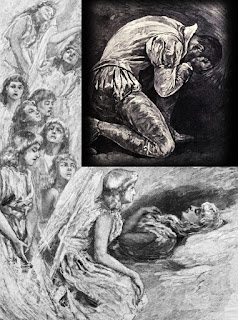The “Lenore” Cycle

Illustrations for “ Lenore ” by Henry Sandham , 1886. Harvard University. Edgar Allan Poe declared that “ The death of a beautiful woman is, unquestionably, the most poetical topic in the world .” [i] It is also, without question, the one which, in his poems, he spent the most time on. In poems such as “The Raven,” “Annabel Lee,” “Lenore,” and “Ulalume,” Poe repeatedly revisits the theme of bereavement over a dead lover. Although Poe wrote poems with this theme even before his wife Virginia passed away in 1847, it is clear that she is the protagonist in these poems—sometimes, in an anticipatory way, as his mourning her began even before her passing. He famously described the ordeal in a letter , writing that, during her long illness, “ I became insane, with long intervals of horrible sanity .” When Virginia finally succumbed, the subject was so painful that Poe’s, perhaps, earliest attempt to write a poem about his grief over her death resulted only in an abortive, but hea

